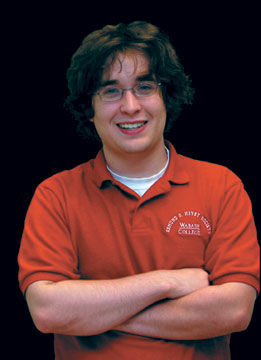An evening talking with alumni about their careers started off as awkward as junior high dance..
—by Nick Gregory ’07, from The Bachelor
 We were all there—a dozen or so students and nine alumni—for the Industry Focus Group hosted by Lu Hamilton and the Office of Alumni Affairs.
We were all there—a dozen or so students and nine alumni—for the Industry Focus Group hosted by Lu Hamilton and the Office of Alumni Affairs.
The alumni were professionals from a variety of fields: physicians, dentists, salesmen, and entrepreneurs. The idea was to get undergraduates and alumni with similar interests into the same room and let them interact—you know, networking.
It started off like a junior high dance. The alumni were on one side of the room and the students were on the other and it didn’t look like one group was very interested in talking to the other. By the time we all had shuffled through the buffet, I was thinking to myself, Please, let this end quickly. My imagination had confirmed all of my fears about interacting with alumni. They were too important and accomplished to want to talk to me, they didn’t think I was interesting, and they would much rather be somewhere else.
We made small talk over the pasta, but eventually the conversation lulled to an awkward silence. Then someone asked the two alumni at our table—doctors Pat Healy and Bob Mehl, both from the Class of 1976—about their experiences at Wabash. I’m sure if someone did a study, they could find empirical evidence showing that that question has a peculiar effect on alumni and undergraduates—namely, that they cease being separated by these labels and simply become a group of Wabash men.
Once that question was asked, the two alumni took off, sharing their experiences at Wabash—how they struggled through certain classes and interacted with the legendary professors of their time.
When the conversation turned to their medical practices, I was able to glean some insight into the politics of physician groups, the difficulty of working with skinflint insurance companies, and the rewards of helping others. Despite being buried under MCAT preparation, a full course load, too many extracurricular activities, and the pressure to perform, I left the conversation feeling excited about medicine—a feeling I hadn’t experienced lately.
When doctors Healy and Mehl had introduced themselves to us, they claimed not to have seen each other for quite some time. Walking back to the house, I began to doubt that claim. My reason: the way they brought home the most important lesson I learned that night.
Maybe it’s just something that naturally happens when two Wabash veterans get together—having had to formulate enough arguments through their undergraduate years, they simply cannot leave a conversation without making a point. As if they had planned it beforehand, the doctors showed us how their own lives wound around a variety of unexpected obstacles and how their Wabash education helped them to navigate through that maze of hidden challenges.
"And it’ll do the same for you guys; Wabash is still great like that," Dr. Healy concluded.
Without knowing it, we had been initiated into a different kind of network than the social and professional ties we had been seeking. It was a network of unique paths through life, but that drew from the same common elements of spending four years (or more) at Wabash.
Walking back to the house to finish some work for class, I wondered where my own path would take me. I thought about the fact that these men had stood in the very spot I was standing, wondering the same things I was wondering. And I got their lesson: that it was okay to not know; that if I could handle Wabash, I could handle life.
Nick Gregory is a biology major who spent last summer as an intern at bio-tech startup Quadraspec. He is editor-in-chief of the College science journal Erotan. Contact him at gregoryn@wabash.edu